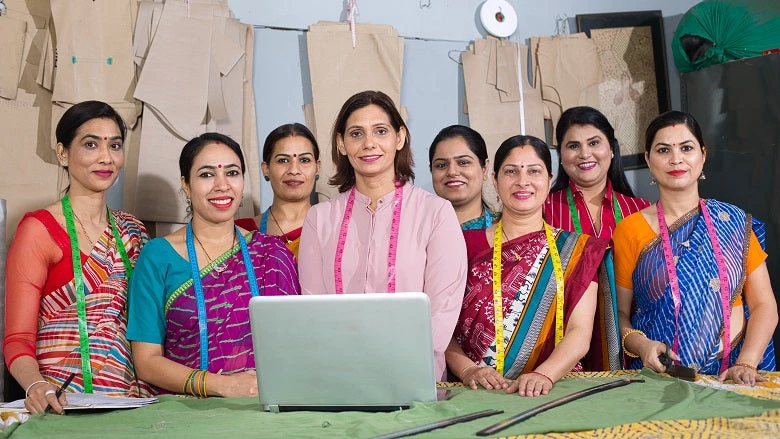
Research by the World Bank and the World Trade Organization (WTO) has shown that trade is a powerful driver of gender equality in developing countries. Firms that are part of global value chains (GVCs) tend to employ more women, and jobs in GVC-integrated sectors are more likely to offer higher pay and benefits than firms not directly engaged in trade.
Yet women’s involvement in international trade is minimal in many developing economies. Take India as an example. Fewer than 5 percent of Indian working women participate in trade and trade-related services such as transport, logistics, and customs clearance, among others, compared with nearly 15 percent of Indian men, as per government of India data.
So, what is the best way to begin involving more women in trade? A good place to start is trade facilitation–the simplification, modernization, and harmonization of export and import processes. World Bank surveys show that trade facilitation disproportionately benefits women’s entrepreneurship and employment in trade-related services sectors across emerging economies.
To make the most of trade as a catalyst for equality, women must be represented and heard at all levels – as founders and CEOs of trade-related businesses and as employees in trading firms. Women also must be represented across different job roles and functions of trade – be it as traders, customs house agents, freight forwarders, or customs brokers.
There’s work to do. Surveys by the World Bank across emerging markets and developing economies reveal several gender gaps in trade. Underrepresented at trade associations and overlooked in government consultations, women aren’t being heard. Moreover, women are less likely to be aware of documentation and customs clearance processes, especially when they are digital – putting them at a disadvantage owing to the gender digital divide – the gap in access, ownership, and usage of digital tools and devices like smartphones.
For India, one of the fastest-growing emerging economies of the last decade, harnessing the socio-economic potential of trade is top of the agenda. The government of India’s recently released Foreign Trade Policy 2023 also lays considerable emphasis on trade facilitation for promoting export-led growth in the country, with a target to take India's exports to $2 trillion by 2030 from about $750 billion currently.
But the barriers to Indian women’s participation are high. Only about one third of working-age women participate in the workforce – already a very low number by global standards – compared with more than three-fourths of Indian men. Direct participants in trade, such as traders, freight forwarders, customs house agents, transporters, and other service providers operate at border areas that may be isolated, outside city limits, even late at night. They must often travel, meet with exporters (who may also be predominantly male), and work long, unpredictable hours.
Taking up such work is especially hard for Indian women, whose families and even landlords often restrict their movement to a limited area, even during daytime hours. The lack of safe and inclusive public transport and limited connectivity to ports, warehouses, and other logistics facilities, lack of clean washrooms, and the threat of harassment are also key barriers.
Moreover, Indian women face a disproportionate burden of unpaid work, such as childcare, elderly care, cooking, and cleaning. A recent government survey showed that Indian women spend 8.4 times as many hours on unpaid work as men. Globally, the average ratio is about three to one. Enduring social norms that perpetuate women’s role as primary care givers limit time available for paid work, particularly if women aspire to be entrepreneurs in the trade and trade-related service sectors.
Yet now, Indian institutions are starting to recognize the role that trade facilitation can play in enhancing women’s entrepreneurship and employment in trade, observed in our ongoing dialogues with industry associations.
The Confederation of Indian Industry co-hosted a workshop in New Delhi with the World Bank on Gender Dimensions of Trade Facilitation in India. The World Bank team also joined the national meeting of Federation of Freight Forwarders’ Association in India to discuss gender gaps and barriers in the sector, especially relating to safety, inclusive infrastructure, and social norms. Women traders said high working capital requirements are a barrier to participating. Moreover, they said obtaining information on regulations and compliance processes, achieving export quality standards, and managing logistics service providers and bankers is harder for women than for male traders.
This isn’t a one-off. The World Bank plans to roll out a survey on the gender dimensions of trade facilitation across India in the fiscal year starting July, 2023. We believe this survey will not only provide an appreciation of barriers to women’s participation in trade, but also help to understand how India’s recent trade facilitation measures can affect men and women across job roles differently. For instance, the introduction of digitized procedures may reduce the need to visit customs facilities – an advantage for all freight forwarders and customs house agents (including women) – but they may disadvantage women traders who lack digital literacy.
The World Bank’s work across emerging markets and developing economies offers two important lessons for India.
The first is that trade has incredible potential to support women’s economic participation, which is so important for creating a more equal world. By addressing the gender gaps in the sector, India can tap into the full potential of its workforce, creating a more inclusive and prosperous economy for all.
The second lesson is about the importance of a discussion on inclusivity. Change starts with conversation. By inviting women to join the conversation at industry associations, and creating the time and opportunity to talk, we ensure women have a voice and can gain from trade. We facilitate understanding, we raise awareness, we inspire change.




Join the Conversation